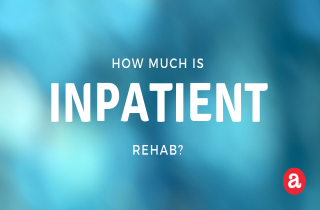Inpatient rehab usually costs an average of about $20K for a 28 day stay in a private clinic. However, there are options which can lower your costs…and federal subsidies can offset this cost.
More here on the prices charged by rehab and how you can work to lower costs. Then, we invite your questions or comments about rehab for alcohol problems at the end.
Is inpatient alcohol rehab expensive?
In a few words: it can be.
Inpatient alcohol rehab is definitely more expensive than outpatient rehab due to the expense of housing and other costs. According to a recent study about the effectiveness, safety, and costs of outpatient and inpatient detoxification from alcohol, the TREATMENT EPISODE cost results were substantially greater for inpatients ($3,300 to $3,600 per patient) than for outpatients ($175 to $388).
Inpatient alcohol rehab: How much does it cost?
The price range of alcohol rehab programs varies depending on number of factors such as:
- Duration of stay
- Location of the treatment facility
- Treatment type (medications raise prices)
On top of these factors, inpatient rehab programs include the price for accommodations, such as a bed and daily meals. All these expenses add up, which is why inpatient rehab programs are considered as one of the more expensive types of alcohol rehab. The average daily cost of alcohol rehab was estimated to be $715 per day.
Is inpatient alcohol rehab tax deductible?
Yes.
You may be able to deduct expenses for medical care related to inpatient rehab in a financial year. Some medical expenses (doctor fees, medications, inpatient treatment, or health insurance premiums) are tax deductible for you, a spouse, or dependents.
According to the IRS tax code from 2013, taxpayers are allowed to deduct the amount of medical expenses that total more than 10% of your adjusted gross income. This can be especially helpful for taxpayers who have lower incomes and high medical expenses. To be sure, check with a tax accountant when you file your taxes to verify whether or not addiction treatment expenses qualify as a deduction.
Is inpatient alcohol rehab covered by insurance?
Usually.
However, health insurance providers look with scepticism at alcohol addiction treatment. What they actually cover depends on their particular policies, in which they set limits for:
- how many days of treatment they will pay for
- the level of treatment that is covered
- the costs of treatment
Some insurers only cover a part of the cost for your residential treatment facility stay. Also, treatment options may be limited to facilities that accept payment through your insurer. Contact your insurance company directly to learn whether your insurance plan includes inpatient alcohol treatment, and contact your chosen rehab center to check if they accept your type of insurance.
Will Medicare pay for inpatient alcohol rehab?
Yes, Medicare covers costs of an inpatient stay. However, you should check if you meet the following criteria before entering treatment:
- you can only be treated in a hospital setting
- the treatment provider will accept Medicare
- your doctor should make a claim that you need inpatient hospital care to treat your addiction
You should also verify your Medicare benefits (this can be sometimes performed by the facilities who have intake counselors to verify them). If Medicare won’t cover inpatient rehab, you may be able to qualify for a sliding scale fee based on your income.
Is inpatient alcohol rehab free?
No, not usually.
Even though inpatient rehab is rarely free, you still have an opportunity to apply for a very low cost rehab through your state’s federally funded alcohol abuse referral program. The process itself may require a lot of engagement from your side. Here we explain several steps that can assist you in finding some federally funded services:
STEP 1: Call the National Drug Abuse Hotline number 1-800-662-HELP
STEP 2: Tell them you’re looking for low cost, sliding scale inpatient rehab. Let them know where you live (this information remains anonymous). Get the phone number for your state’s federally funded substance abuse treatment agency, a division within the state’s Department of Health and Human Services.
STEP 3: Call your state’s Department of Health/Substance Abuse Division and get the phone number from your district’s substance abuse service administration. Districts are usually counties or groups of counties that operate within a state’s budget.
STEP 4: Call the district substance abuse service clinic to set up an initial intake appointment in the county where you reside. Complete the drug use assessment. Each county provides different services and you usually have to have proof of residence to access your state’s services.
Sliding scale inpatient alcohol rehab cost assessments
Inpatient rehab centers may also offer a sliding scale fee. This means that you may be able to pay for treatment at a lower cost based on what you can afford. In these circumstances, admissions officers will usually complete a financial assessment before offering lower prices for addiction rehab. You may be asked to provide evidence of your financial situation such as bank statements and a payroll or salary stub.
Inpatient alcohol rehab financial aid and assistance
You can access inpatient alcohol rehab in various ways and settings. Scholarships may be one way to get financial aid, it is better to phone or visit a treatment facility and ask about the programs they offer and how much they cost. They will also help you set up a payment plan.
These are some of the things you should have in mind before choosing rehab:
- Is it covered by health insurance (Medicaid/Medicare or private)?
- How is the payment expected: upfront or you can pay incrementally?
- Is sliding fee scale offered?
- Can I claim any of this treatment at tax time?
Try to talk with a doctor about all of these concerns. If you still cannot find the information needed, please ask us about inpatient rehab in the comments section below.









Related Posts